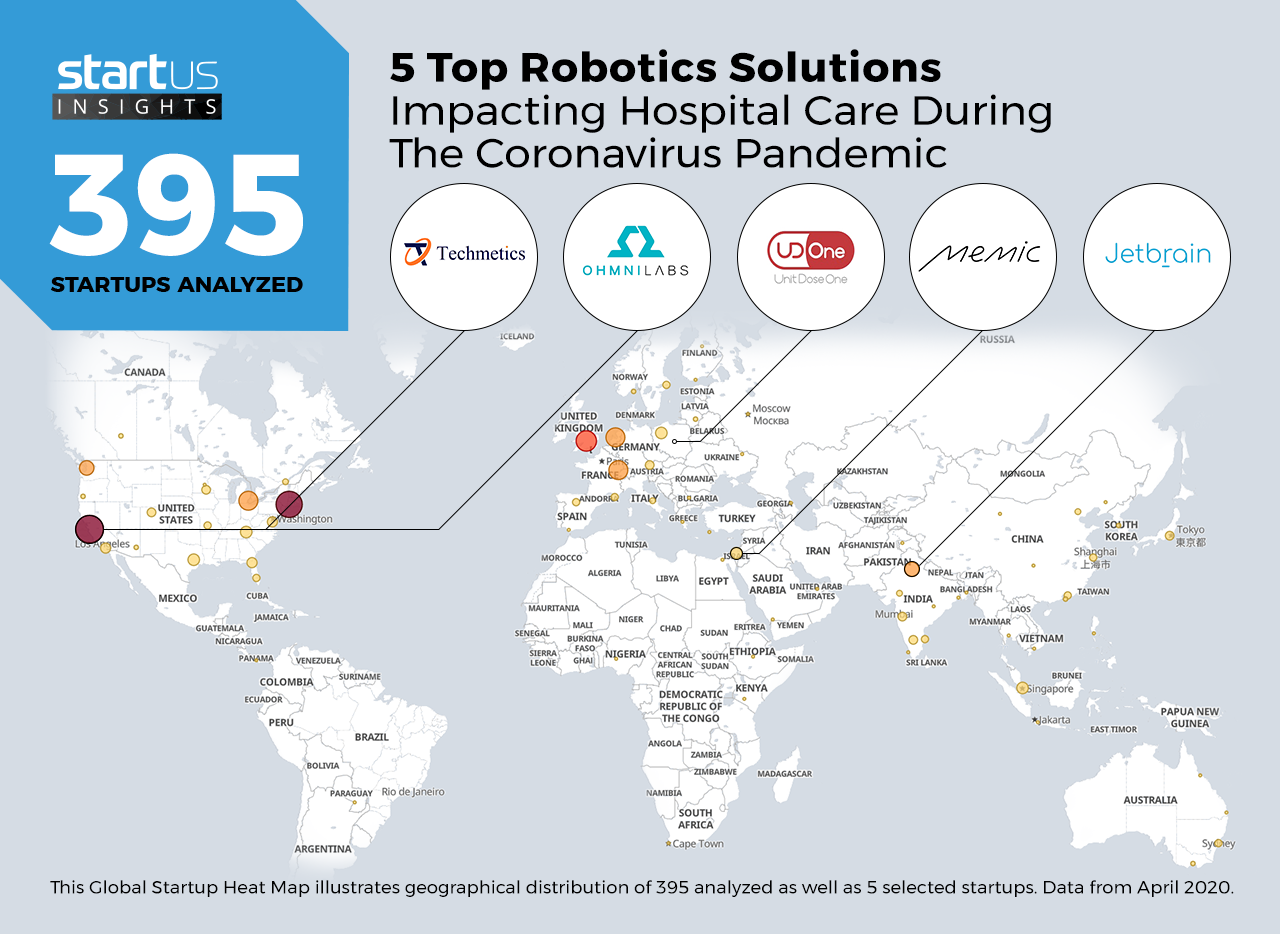Accelerate Productivity in 2025
Reignite Growth Despite the Global Slowdown
Our Innovation Analysts recently looked into emerging technologies and up-and-coming startups working on emerging solutions that mitigate the effects of the Coronavirus pandemic. Here, we are taking a look at some of the top robotics solutions impacting hospital care.
Heat Map: 5 Top Robotics Solutions
We use a data-driven startup scouting approach to identify the most relevant solutions globally. The Global Startup Heat Map below highlights 5 interesting examples out of 395 relevant solutions.
Techmetics – Intralogistics
Hospitals have a lot of intralogistics operations underway at all times. These include delivering food and medicine to patients, samples to the lab, and reports to doctors. Robotics solutions automate and thereby speed up the movement of medicines, samples, and reports to assist hospitals to manage the overwhelming activity during the coronavirus pandemic.
Techmetics, a US-based company, develops service robots for the healthcare, hospitality, and manufacturing sectors. The touch-screen operated robot Techi Butler has a payload of 60 kg (132 lbs) and completes multiple deliveries in a single step. Other robots from Techmetics perform functions such as autonomous delivery of food from the hospital kitchen to the patients or picking linens.
OhmniLabs – Telepresence
While telehealth has been around for quite some time now, telepresence solutions are witnessing renewed interest during the coronavirus pandemic. Telepresence robots allow nurses and doctors to monitor their patients and follow-up on their treatment, respectively, without the need to be physically present. Moreover, these robots allow the patients’ families, who may not be able to meet them for fear of getting infected, to interact with them.
The US-based startup OhmniLabs builds personal robots for telepresence and senior care. Ohmni® Supercam combines a high-resolution camera and low-latency encoding to provide an immersive, ultra-wide field of view. The robot uses machine vision to move silently and smoothly on any surface and dock automatically for charging. For senior care, OhmniLab’s solutions allow remote control of the robots to provide families full control over the communication.
UnitDoseOne – Robotic Hospital Pharmacy
As many hospitals have reached or exceeded their capacity due to the coronavirus pandemic, hospital staff find it difficult to manage logistics. One crucial role is the delivery and administration of drugs to all patients. Robotics solutions automate the dispensation and administration of drugs so that the staff can focus on other urgent issues.
The Poland-based company UnitDoseOne provides a robotic hospital pharmacy. The solution assumes total control of hospital drug logistics, tracks which patients need what medicines, prepares individual doses, and keeps a record of who prescribed and who delivered the medicines. The robotic pharmacy is modular and scalable to serve healthcare facilities of any size.
Memic – Robot-Assisted Surgery
Despite using personal protective equipment (PPE), surgeons have to risk contracting the coronavirus while operating on COVID-19 patients. Surgical robots enhance the success rates of near-impossible surgeries and save time spent on surgery. They also reduce the contact between surgeons and their patients, thus significantly minimizing the chance of infection. Other benefits of robot-assisted surgery include reduced pain and discomfort, smaller incisions, faster recovery, and shorter hospitalization.
The Israeli company Memic develops a small and flexible robot for surgical procedures. HominisTM displays superior surgical and ergonomics capabilities to reach difficult spaces while keeping cost and footprint to a minimum. The robot is compact, has a short learning curve, and provides 360° maneuvering to avoid obstacles. This opens up multiple applications for robot-assisted surgery, including transoral surgeries.
Jetbrain – Patient Care
Compared to doctors, nurses are probably even more prone to catch an infection from patients, given that they interact more closely and longer with the patients. Patient care robots minimize contact between nurses and patients by undertaking some of the routine tasks. These include duties such as continuous monitoring, timely medication, and answering queries. This enhances the productivity of the hospital staff and allows them to focus on crucial tasks as they attend to an unusually high number of patients during the coronavirus pandemic.
Jetbrain, an Indian startup, offers autonomous mobile robots (AMRs) for hospitals. Their assistive care robot, ARYA, enables 24X7 monitoring of patients and assists hospital staff with timely medications. Its Artificial Intelligence (AI)-enabled chatbot answers query specific to health or the hospital. Jetbrain also develops generic transportation robots that scan labels and push real-time updates to the hospital enterprise resource planning (ERP) system.
How To Flatten The Curve?
This is an unprecedented situation for many of us across the world. The SARS outbreak in the early 2000s claimed 774 lives. That toll was enough to drive research & development and easier healthcare solutions. It is an encouraging fact that several mobile health, e-health, diagnostics, and remote health startups and emerging companies are able to respond during a pandemic. With thousands of deaths already, we expect to see numerous new companies offering technology-driven solutions to help doctors, nurses, other health workers, and the larger public.








